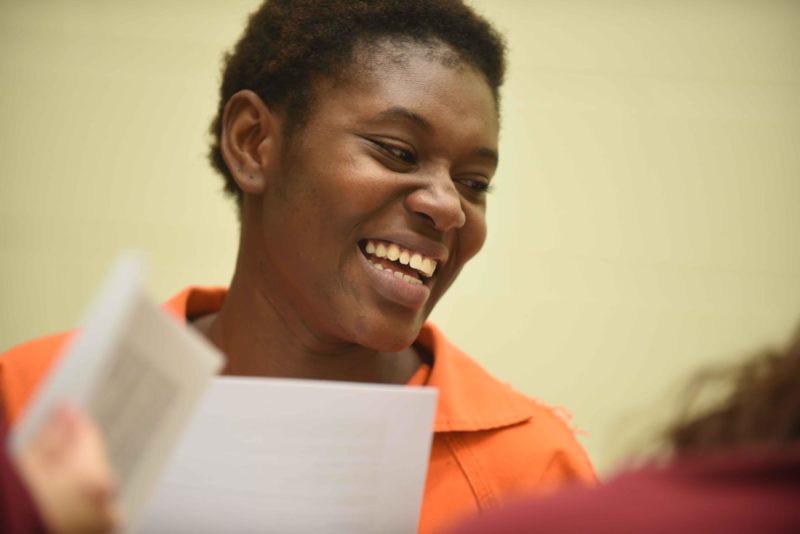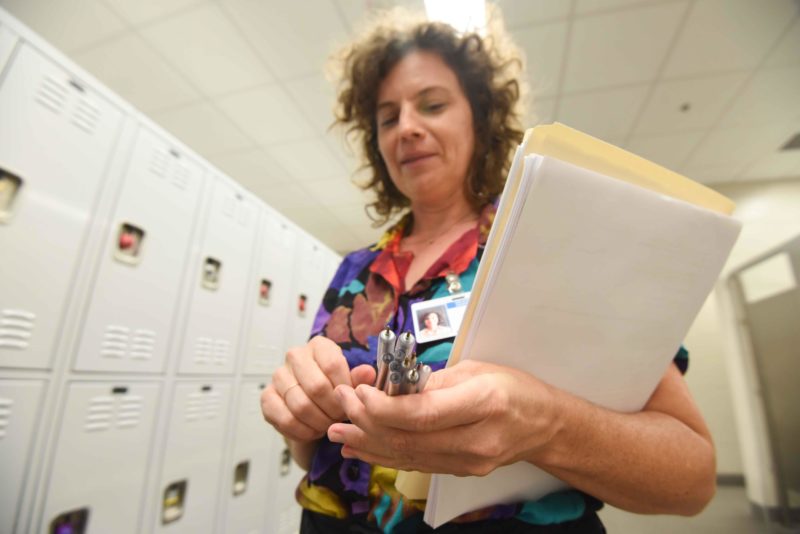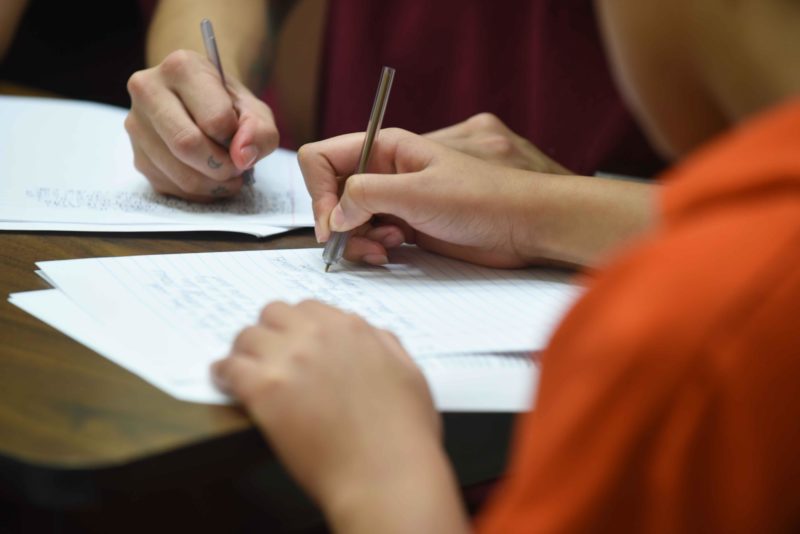
Student of LPEC (photos by: Tracie Morris Schaefer,)
New Orleans is often described as a “close-knit” city. On certain city blocks you will find residents gathered around corner stores, a neighborhood bar, a park, the neutral ground, or on each other’s porches. Head down Broad Street toward Tulane Avenue, however, and you will find an empty zone where no one gathers. This is Orleans Parish Prison, now known as the Orleans Justice Center.
Surrounded with barbed wire, the stalwart and stark jail does not beckon social interaction or lingering; yet, that does not stop some organizations and individuals from entering the jail’s doors and trying to make a difference in the lives of prisoners. One such organization is the Louisiana Prison Education Coalition (LPEC), which began in 2015.
The LPEC aims to increase accessibility to educational programs for those that are affected by incarceration, and one of their branches stems back to the University of New Orleans. “My colleague in the English Department here are UNO, Randy Bates, who is a creative non-fiction teacher and writer himself, suggested that we get our graduate students here at UNO who are in a MFA program involved in a more formalized way teaching in the jail,” Elizabeth Steeby, a UNO professor and participant with LPEC explains.

Elizabeth Steeby, UNO professor and instructor for the LPEC (photos by: Tracie Morris Schaefer,)
In order to bring education to the prisoners, the public, and the students of UNO, Steeby and her colleagues create a curriculum that opens the possibility for interaction and expression through educational avenues. There are group sessions with those affected by incarceration or fully incarcerated where they are asked to do free writes, to create poetry, and to learn and share in an educational environment. With Louisiana having the highest incarceration rate in the world, this educational outreach aims to help individuals achieve educational goals they may have been denied for one reason or another–whether that be before incarceration or due to incarceration.
The LPEC works on a 360 degree educational model. Their aim is not only to educate those individuals who are incarcerated but also the public about what it means to be incarcerated. And, they are not alone. This is a coalition in its very definition since there are many organizations, such as Voice of the Ex-Offender (VOTE) and Women with a Vision, just to name two, that want to help individuals affected by incarceration retain and maybe even redesign their identity. For the LPEC, holding classes with the inmates–a place where they can read, write, discuss, and set educational goals–is one way to reach, connect, and encourage those that are incarcerated.
They don’t stop there, though. Through their publication efforts, they bring the lessons, the words, and the experiences from inside the jail to the outside world. This is seen in their newest publication of poetry from female inmates entitled Unheard Voices. As Steeby explains “…we really see the magazine as doing some work of educating the public of the experiences of the people who are in jail or [who] have been affected by larger structures and systems of oppression.”

Female writers and participants in LPEC classes (photos by: Tracie Morris Schaefer,)
The publications include creative writing as well as elements of storytelling that describe what it is like to be incarcerated or be affected by incarceration. “I’d really encourage people to seek out the stories that are told by those who have been incarcerated,” Steeby says. “What you hear so often is people generally feeling that everybody deserves freedom. The freedom too build familial connections, to have jobs they care about, to express their ideas in meaningful ways at the basic level, and quite frankly, experiences of incarceration can prohibit that long past the moment of being incarcerated,” Steeby says. “It [incarceration] has long-term impacts.”
People constantly talk about how education is the great equalizer. Education gives someone purpose, insight, it can build empathy, and it gives hope and maybe even direction for a desired life. With educators like Steeby, organizations that aim to cross the threshold that looks off-limits to the public, and students who want to make their curriculum live and have an impact beyond the classroom walls, there are now safe spaces for incarcerated individuals to learn about themselves and the world while also teaching others and the public. The lesson here seems simple: be a good student of life by thinking and choosing to listen to all voices, especially the unheard ones.
To learn more about and to get involved with the Louisiana Prison Education Coalition, you can check out their website. The LPEC will be supporting and participating in the upcoming event Cannot Be Free Until You Are: Formerly and Currently Incarcerated Women and Girls Day, which is a march and rally on December 15, 2017. Their aim is to “wake up and shake up Louisiana on how mass incarceration affects women and girls.”
 NOLAbeings Multimedia artist Claire Bangser created NOLAbeings as a portrait-based story project that marries...
NOLAbeings Multimedia artist Claire Bangser created NOLAbeings as a portrait-based story project that marries...  Voodoo in New Orleans: Reviving history: New Orleans fortune telling This article takes a deep dive into the history of Voodoo in New Orleans, its hybridization with Catholicism, and its present-day place in the city's culture. The author visits fortune-tellers in the French Quarter, using their guidance as a tool for introspection rather than a deterministic predictor of the future. Through her experiences in New Orleans, the author feels a mystical connection to both the past and the future.
Voodoo in New Orleans: Reviving history: New Orleans fortune telling This article takes a deep dive into the history of Voodoo in New Orleans, its hybridization with Catholicism, and its present-day place in the city's culture. The author visits fortune-tellers in the French Quarter, using their guidance as a tool for introspection rather than a deterministic predictor of the future. Through her experiences in New Orleans, the author feels a mystical connection to both the past and the future. 
[…] https://www.vianolavie.org/2017/12/14/the-louisiana-prison-education-coalition-360-degrees-of-educat… […]